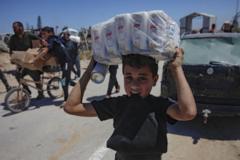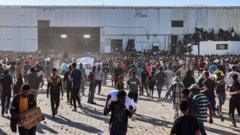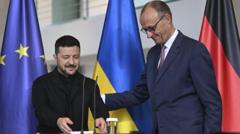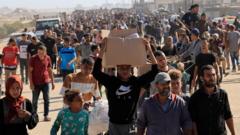As casualties soar in Gaza, EU officials, including Kaja Kallas and Ursula von der Leyen, criticize Israel's military strategy. They oppose proposed changes to humanitarian aid distribution that exclude UN involvement. The ongoing conflict has led to a staggering death toll, raising alarms over humanitarian conditions.
EU Critiques Israel's Military Actions in Gaza Amid Humanitarian Crisis

EU Critiques Israel's Military Actions in Gaza Amid Humanitarian Crisis
Kaja Kallas, the EU's foreign policy chief, condemns Israeli air strikes as excessive and unsupportive of blockade alternatives, while humanitarian aid struggles to reach Gaza.
The European Union's chief diplomat, Kaja Kallas, has spoken out against Israel's military strikes in Gaza, asserting that they "go beyond what is necessary to fight Hamas," in light of the worsening humanitarian situation. The ongoing Israeli air strikes have reportedly resulted in a death toll exceeding 54,000, as reported by the Hamas-run health ministry. Kallas further emphasized the EU's disapproval of a new aid distribution model supported by the United States and Israel, which aims to bypass traditional humanitarian organizations. "Humanitarian aid cannot be weaponised," she stated firmly.
Amid escalating violence, Kallas's comments come after German Chancellor Friedrich Merz expressed confusion over the objectives of Israel’s military actions, stating that the impact on civilians can no longer be justified in the fight against Hamas terrorism. The EU, as a major humanitarian aid provider to Gaza, has faced challenges in delivering aid due to a complete blockade that Israel imposed in March. Kallas highlighted that most aid is obstructed and cannot reach those in dire need.
At a recent press conference, EU Commission President Ursula von der Leyen condemned Israel's attacks on civilian infrastructure in Gaza, describing them as "abhorrent" and "disproportionate." This criticism follows similar statements from leaders in the UK, France, and Canada, with the UK announcing the suspension of trade talks with Israel in response to its military actions.
In addition, the EU plans to review its trade agreement with Israel, with Kallas indicating that options for action will be presented at the upcoming EU foreign ministers' meeting in Brussels. As Gaza's 2.1 million residents face critical food shortages, there are growing concerns regarding the new aid distribution model spearheaded by the Gaza Humanitarian Foundation, which utilizes private security contractors and bypasses the UN.
Israeli Prime Minister Benjamin Netanyahu has affirmed intentions to relocate Gaza's population to a "sterile zone" while military operations continue. He has also mentioned plans for what he termed "voluntary emigration," which many perceive as forced displacement. This military campaign initiated by Israel followed a cross-border attack by Hamas on October 7, 2023, which claimed over 1,200 lives and left many others as hostages.
The ongoing conflict continues to raise urgent questions about humanitarian access and the protection of civilians in the region.





















